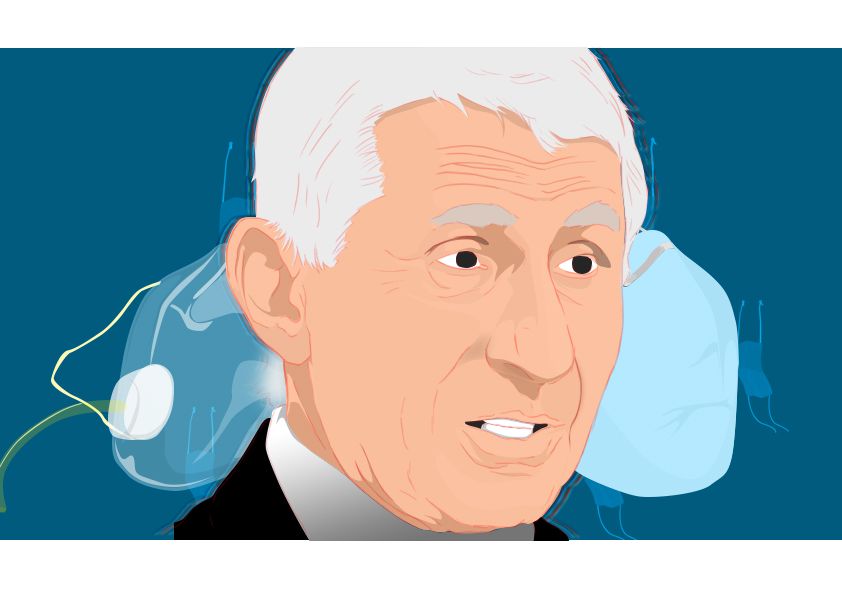In an age where experts and scientists are questioned over their commitment to the betterment of humanity, “Fauci” delves into the career and achievements of the renowned scientist Anthony Stephen Fauci. The National Geographic documentary has been accused of attempting to promote leftist-propaganda. Naturally, this backlash comes from the right-extremists of whom the majority has questioned the effectiveness of the Covid-19 vaccines.
“Fauci” does glorify the scientist but is that so bad?
Scientists and scholars deserve the praise and recognition for their contribution to the betterment of society. The documentary showcases the flak people in the medical field receive because of the negligent attitude of the people in power. Fauci explains that there is a long process for researchers to get grants and trials approved. And by the time grants were sanctioned and trials approved, activists and naysayers had taken to the streets looking for a guinea pig for their movements.
Fauci was one of them.
In 1981, Fauci read an article in a publication called Morbidity and Mortality Weekly Report (MMWR) where 5 healthy men, notably all homosexuals developed a strange type of pneumonia called pneumocystis pneumonia. His response? “This must be a fluke.”
A month later, he discovered a report in the same publication that 26 gay men had contracted the deadly disease. He was shocked to see that they also had “Kaposi’s Sarcoma, a tumor, a cancer!”
It dawned on him that this was a brand-new disease.
His fight against HIV/AIDS created the trio of Fauci, Director of the National Institute of Allergy and Infectious Diseases (NIAID), Henry Masur, a Senior Investigator at the National Institutes of Health, and Clifford Lane, NIAID Deputy Director for Clinical Research and Special Projects.
ACT UP, a political group working for the end of the AIDS pandemic were at horns with scientists and researchers for their lackadaisical attitude in finding a cure. It should be noted that a large chunk of funding for medical research in America comes from the Federal Government.
Thus, a natural consequence of this is a rather complicated relationship between the scientific community and those in power who control the purse strings but for the most part are ignorant of even the most basic scientific facts.
At the 1990 International AIDS Conference in California, the relationship between the scientific community and ACT UP was at a breaking point. Protestors were rowdy, impatient and violent.
“If they feel that they’re (researchers) going to be demonstrated against, they’ll just get out and do their work in cancer and Alzheimer’s disease and heart.” This was the feeling around the scientific camp as the blood and sweat they’ve poured into the research is being demonstrated against.
The documentary shifts between Fauci’s role in the AIDS and the Covid-19 pandemic.

He has been the Director of NIAID since 1984 but has never been a household name. The Covid-19 pandemic changed everything. “Fauci” describes the troubled relationship between Fauci and former US President, Donald Trump. Fauci’s rise to fame also started with the press conferences held in the White House where he openly contradicted Trump’s statements. One such incident was when Trump endorsed an anti-malaria drug called hydroxychloroquine.
Fauci warned against its usage and stated that while some may have gotten better because of it, in medical nuances, it was purely anecdotal. “It was not done in a controlled clinical trial, so you really can’t make any definitive statement about it.”
Such controversial incidents gained him a large number of supporters but at the same time, sceptics and haters. He became a global icon. Overnight!
“Fauci” provides an informative take on the life of one of the world’s most influential men. The life of a workaholic, a motivated investigator, and a man who believes in science above all else.
And sometimes, a little too much of a workaholic. 12-13 hour shifts daily. Absence from your family.
His wife, Dr. Christine Grady, mentioned in the documentary that “there were times when their children would not see him for a couple of days.”
“I wouldn’t say I neglected the raising of the children but I did not sacrifice professional things as much as maybe I should have,” Fauci replied.
Being a neutral observer of American politics, the documentary rises above the realm of the so-called leftist-propaganda or a glorifying portrayal of a man who defied Trump. It shows an honest, hardworking man who genuinely wishes the eradication of some of the world’s deadliest diseases. Although the portrayal has been slightly muted, where controversies to his name were left out, such as being associated with funding the now-famous Wuhan Virology Lab, accusations of animal abuse or the fact that he asked Americans the needlessness of wearing masks, Fauci has been at the forefront of multiple pandemics and is one expert I would trust my life with.
The problem with politicizing each and every form of media is the inability to appreciate a good drama/documentary. The reviews on American movie and television review website, Rotten Tomatoes demonstrates this. According to movie critics, they scored the documentary an 88 percent while audience reviewers scored it a paltry 2 percent. It was also scored an extremely low 1.1 out of 5 on Google reviews.
““Fauci” makes no pretense about where its sentiments lie, lauding a figure whose critics have seemingly twisted his image beyond recognition in their attempts to demonize him.” Reviewed Brian Lowry, a senior writer at CNN and named as a top critic by Rotten Tomatoes.
While on the other side, Michael L, a public reviewer on Rotten Tomatoes, emphasizes on the biased angle of the documentary.
“Fauci really missed the mark. Rather than showing the good AND bad about Fauci, it instead paints him as a perfect yet under-appreciated hero. No part of this film feels honest; it feels like an artificial and insincere attempt to bolster his reputation. It’s a no for me.”
The disparity in ratings provides an insight into the extremely tumultuous political situation with global figures, unfortunately, even with an 80-year-old scientist who has devoted his life to curing the sick and needy.

